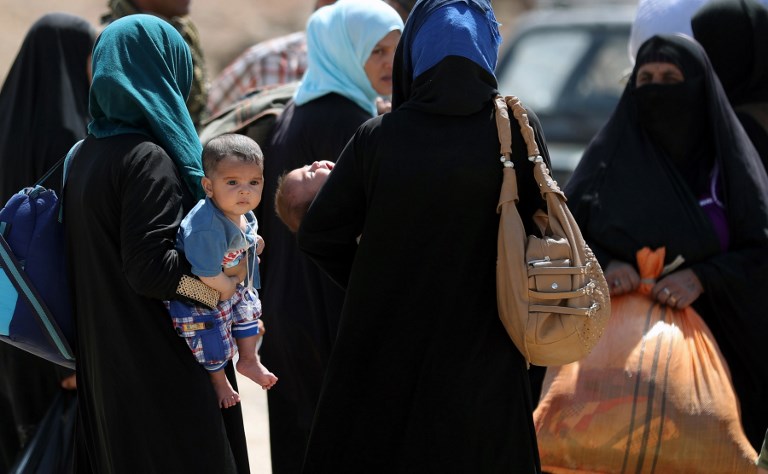When the Turkish-backed Free Syrian Army took control of Al-Bab in early 2017, the sisters fled to Raqqa, on the northeast banks of the Euphrates river, a hundred miles north of Aleppo. Since then, no one has heard from them. But before they left, the eldest sister left a record that offers a glimpse of their life under ISIS, heretofore shrouded in mystery. Her story is one in many of girls who have been brainwashed and radicalized by IS.
The story of the big sister spans the years between 2005 and 2016 during which IS controlled Al-Bab. Her journey with IS began at the city’s Al-Iman mosque where she enrolled in religious classes and Quran studies.
“My husband was from a well-known family in Al-Bab. He treated me well. I had a good life,” she reminisces, “but we didn’t have children. I decided to consult with Umm Mohammed Al-Almaniyya (The German Umm Mohammad) who, in addition to being a preacher at the mosque, was originally a gynecologist who came from Germany with her husband, Abou Mohammed Al-Almani, to join the Islamic State. She examined me, and reassured me, in her broken Arabic, that I was perfectly able to conceive, but my husband was sterile. She asked if he was a smoker. I told her that he actually was.”
A few religious lessons later, the sister was totally convinced of the necessity to divorce the man whom Umm Mohammad called an apostate, and to marry a “mujahid” brother, which would “earn her a reward here on earth.”

“I let Umm Mohammad in on my resolution to divorce my husband,” she recounts, “One day, he showed up at the mosque to fetch me. I had then begun regular attendance of classes and Quran sessions. Umm Mohammad al-Almanya stepped forward and confronted him: “you’re an apostate. By remaining your wife, she is breaking the law.” He began to yell. He tried to pull me out of the mosque by force. Umm Mohammad called the hisbah (IS morality police) on him. A patrol arrived, headed by the emir of hisbah in Al-Bab, Yusuf Abu Kahat, and they arrested him. Soon after, my brothers also came to try to fetch me. I refused to leave with them, and the hisbah arrested them, too.”
She continues, “Abu Kahat returned with his patrol the next day, along with my husband, who now had cuts and bruises on his face. They asked me to just stand face-to-face with him, and the emir divorced us. Then they released him.”
That is when the woman’s real life with IS actually began.
“After that I entered iddah (the traditional post-divorce waiting period), staying with other Muhajirat (female IS members) at the mosque. A few days later, I had my period. Umm Mohammad then decided that there was no obligation to complete iddah, since I was not pregnant. She also determined that I must accept the marriage proposal of a Saudi man, called Abu Dhar al- Jirzawi, whom she praised as a good mujahid (religious warrior.) “The Lord rewards mujahideen like him with hoori (heavenly maidens). And you are destined to be his hoori here on earth. Our duty is to provide sexual relief for the mujahideen, marry them, and become their companions later in heaven.” Umm Mohammad gave me a book on IS sexual codes and rules, published by the Da’wah Religious Outreach Department in Mosul.”
“A few days later, without informing or seeking the approval of my family, I married Abu Dhar, who was a hisbah member. As his wife, I also joined hisbah’s women brigade.”
“My work with hisbah ushered in a new phase of my journey with Isis. Along with foreign muhajirat, we set out enforcing IS interpretation of Sharia law. If a young woman committed any violation, we would summon her to the mosque and marry her off to a mujahid.”
Three months later, Abu Dhar al-Jirzawi was killed in the battle to capture Kobani City. Our woman then entered iddah, the traditional mourning period. But after a few days only, Umm Mohammad came to her again. She gave her a pill to accelerate her period: no need for her to continue mourning. “The Lord” has decided to reward the widow’s loss by offering her another husband, thus giving her a second chance at being a hoori on earth. A friend of her late husband, named Abu Mohammad al-Saudi, a warrior in his own right, has just proposed. Umm Mohammad said he was well-off and gifted with “high morals.” A fellow combatant whom her late husband asked to marry her in case he gets killed, so she would not “turn into a temptress here on earth.” Such is the custom amongst mujahideen in the battlefield.
The sister reflects: “I had no other option. My family had cut ties with me. I had nowhere else to go. So I married al-Saudi, resumed my work in hisbah and continued to take classes at the mosque.”
Eventually, one of her sisters began to join her at the mosque. The same pattern repeated itself with the latter: “Umm Mohammad and I persuaded her that her husband is an apostate, a smoker who does not pray, nor does he fulfill his duty in the holy war. And so, her husband was coerced to divorce her. She then married a foreign mujahid. Like me, she joined hisbah, and shortly after, our younger sister, who was single, followed suit as well.”
The three sisters went on to become infamous in the hisbah ranks. When they were not committing heinous crimes against other women in Al-Bab, they were marrying off young girls to foreign muhajireen. The latter practice was fattening their coffers: for a foreign mujahid pays up to a thousand dollars for a marriage deal.
In a tribal and religious community like Al-Bab’s, people quickly got wind of the three sisters’ misdeeds. The humiliation that the brothers felt, and their fear of retaliation from IS should they oppose their sisters’ acts, reached a breaking point. They fled the area.
We recently met their mother in Turkey. The last she heard from them was a few years ago. They were still with Isis. She believes her daughters were brainwashed by hisbah, whose only goal is “to wage a war on customs and traditions.” She tells us: “I never imagined my daughters would call me an apostate, put me in jail because I smoke cigarettes, and because I spoke against what they did. And yet each time I tried to escape, this is what they reported me to hisbah for, and tried to get me arrested. Finally, after many attempts, I was able to flee to Turkey.”






